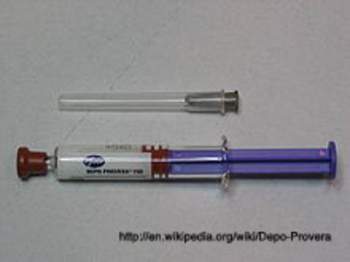
Depo-Provera

What is Depo-Provera?
Depo-Provera is the brand name of depot medroxyprogesterone acetate which is a drug that prevents pregnancy. It is manufactured and distributed by the Pfizer Corporation. It is administered via an injection and protects against pregnancy for three months. It is highly successful at preventing pregnancy and requires less drug interaction than once-daily birth control pills. For this reason, Depo-Provera’s status a as long acting reversible contraceptive is highly desirable for many that cannot maintain a contraceptive regimen such as with birth control pills.
Where can I get a Depo-Provera shot?
Most medical providers and some organizations such as Planned Parenthood have the shots available. It is the responsibility of the patients to regularly schedule the shots and to be aware of the potential risks of using the shot. In addition to the benefits, there are side effects that may prohibit some women from taking this shot.
How does Depo-Provera work?
The Depo-Provera shot works by releasing the hormone progestin into the body which works on the ovaries to prevent them from releasing egg and increasing vaginal mucous to inhibit pregnancy. This is effective for 99 out of 100 women that receive the shot. There are some side effects including irregular menstrual periods, depression, dizziness and acne and most importantly, loss of bone density.
What is the controversy around the use of the Depo-Provera shot?
As Depo-Provera has been found to decrease bone-density women with a history of or risk factors for osteoporosis should not receive this shot as it will exacerbate this condition. All women will need calcium and vitamin D while on this shot. Still, others have made the claim that the bone density loss that accompanies the shot is not articulated properly to women that receive the shot and that the bone density loss is irreversible.
What should I do if I have experienced bone density loss?
Bone density loss can lead to a number of injuries and an increase of potential injuries. If you feel that you were not provided adequate notice of the dangerous of bone loss, you may be able to hold the provider or manufacturing company liable for damages. As in all liability cases, the victim must prove that that injury or harm was on cause on the part of the provider and that the provider was aware of the potential harm but chose not to inform the plaintiff about the danger. Especially in cases with bone loss, the harm is potentially irreversible and imperils their ability to have children or live a healthy life.
Speak with an attorney if you feel you have not been adequately warned or you feel your medical provider is liable for failing to inform you of the potential risks of using this medication.



















